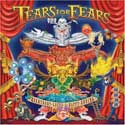
Tears For Fears
Everybody Loves A Happy Ending
Sony
Picture this: The reconstituted Tears For Fears are giving a rooftop concert to promote their new CD Everybody Loves A Happy Ending. When suddenly a man in a Hall and Oates T-Shirt, a picture of David “the most beautiful man in the world” Sylvain in his wallet, a copy of Tears For Fears’ Going to California [live] video in one hand and a bullhorn in the other, steps out of the crowd…
Man: THROW DOWN YOUR BEATLES ALBUMS AND COME OFF OF THE ROOF!
Curt Smith’s keening voice helped define the Tears for Fears sound on such tracks as “Everybody Wants to Rule the World,” but he and co-founder Roland Orzabal split after the Seeds of Love tour. Orzabal carried on under the band name with Elemental, which promised to be the start of a new phase and achieved some success. However the follow-up, Raoul and the Kings of Spain, never connected with radio listeners the way that records like “Shout” and “Everybody” had. Smith recorded a solo album which was never released in the US and which he now disowns, and later he attracted some critical notice with new band Mayfield. And both men wrote Lennon vs. McCartney-esque songs and answer songs bitching about each other publicly.
Remember that, it’s going to be important.
Some may say the reason I dislike this album is because Orzabal and Smith want to relive their childhood, and I want them to relive mine. There’s some truth to it. Most of us are biased to one degree or another towards the music of our teens, and for me that’s music like Joe Jackson, the Fixx, the Go-Go’s…and Tears For Fears, as they once were.
Their name and most of their first two albums derived from the works of therapist Arthur Janov, whose theory was that “direct confrontation with . . . early feelings of loss is vital for emotional catharsis.” What Tears for Fears were about was singing that which could not be said. What’s remarkable is that they managed to do this while becoming superstars, considering the twisted nature of some of their greatest hits. Singles like “Mad World” and “Shout” contained some of the most disconcerting lyrics ever to go to the top five. What put them over was the music; driven by breezy keyboard lines and agreeable chord changes, with heavy synth hits and circular drum patterns. It created a soundscape that matched the lyrics to a soundtrack that was sometimes cold but never emotionless, thanks both to Orzabal and Smith’s deeply felt vocals and painstaking performances by the band.
There might be something to be said for a re-grouping that refuses to become essentially a cover band of themselves (as happened to Pink Floyd). For just saying, “this is Tears For Fears, 2004.” But Everybody Loves A Happy Ending is more than just a bad album based on my conception of what Tears For Fears should be. If I had picked this album out of a pile with no idea who it was, it would still be going into my “Oh great, more proof that The Beatles and The Beach Boys did more harm than they’ll ever know” box.
That Lennon vs. McCartney thing should have been a warning. See, back in the day Orzabal and Smith reportedly became concerned their music had lost its soul, following the over intellectualized Songs from the Big Chair sessions. They were wrong, but never mind; the more live-sounding Seeds Of Love and cathartic, jazzy Elemental were good results of this concern. The ghosts of The Beatles (Lennon especially) and Brian Wilson were evident on these records but not overbearing; they were still great Tears For Fears records in particular.
But such paeans to lost youth have offensively now taken center stage. It’s as if Tears For Fears couldn’t even be bothered to craft an album that sounded like 1985, let alone 2004: No crystalline modern engineering, no selective arrangements, etc. It’s an album of guitar-driven songs that think all you need is love (sung in multi-tracked harmonies). Performances are sloppy but “spontaneous, maan” in a boring, embarrassing and thus very rock ‘n’ roll fashion. (There is nothing worse than a synth pop group that tries to become a rock band. This is what almost killed Dave Gahan and destroyed Kajagoogoo’s career.)
Beatles’ quotes include the coda of “Who Killed Tangerine,” a song that demands “Hey Judes’” na-na-na-na-na-na-nas be sung over it, and I counted two (count ‘em, two) approximations of Pepper’s famous cacophony of sound. From men who once wrote lines like “If I could change your mind, I’d really love to break your heart,” lyrics of such mind-numbing minutiae as “Someone’s drinking all alone…someone’s left the TV on” are a let-down.
Orzabal and Smith also once wrote “Kick out the Style, Bring back the Jam!” A fair sentiment (and, I realized for the first time writing this review, a neat little dig at Paul Weller), but one that should come with a warning label: Sooner or later, a jam is always more fun for the players than the people who get to listen.
Sony: http://www.sonymusic.com












